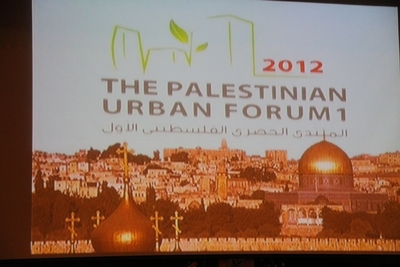The First Palestinian Urban Forum is Successfully Concluded and Recommends Cooperation between the Different Parties with regard to Urban Development
The First Palestinian Urban Forum which was organized at An-Najah University was successfully concluded following three days of discussion sessions and presentations delivered by a wide range of participants who represented the different ministries, governmental bodies, various Palestinian organizations, international institutions and members of municipalities and local bodies, in addition to academics, students, experts, professionals, engineers, international experts and figures, as well as the different media agencies.

The Forum consisted of many discussion sessions in which the participants addressed four major topics: the challenges of urban development and future plans, administration and urban government, the policies and practices of architectural planning, as well as issues of land and housing. The Forum also included a number of roundtables for ministers, officials, mayors, planners, experts, the private sector and young experts in urbanism. Other sessions addressed issues of planning in areas of special concern such as C Area, Jerusalem and Gaza, safe cities and disaster risk reduction, the role of women in the urban environment, and preserving cultural heritage. Additionally, the Forum included a grand exhibit which was held at the Korean-Palestinian IT Institute of Excellence, New Campus.
In the concluding sessions, the participants presented the final recommendations which included: Reinforcing relationships and coordination between the different parties working in the field of urban development, reinforce the capabilities of the different Palestinian institutions in order to produce the suitable laws and systems on all levels, providing effective planning policies and tools to develop urban communities, the importance of implementing national policies for Palestinian housing, in addition to reinforcing and activating partnership between the public and private sectors with respect to housing and housing investment.
The participants also called for developing the technical and human potentials in the Palestinian municipalities and to work on transforming them into electronic ones, paying attention to the environmentally-friendly buildings, promote the use of renewable energy, reinforcing the independence of the Palestinian electricity company, as well as emphasizing the necessity of establishing a special society that would bring together Palestinian planners and the importance of establishing a Palestinian disaster risk reduction strategy.
Other recommendations included the involvement of women and the youth in urban planning, the development of curricula that supports planning, the consideration of the needs of marginalized groups of people when carrying out developmental planning and link it to urban planning, in addition to the importance of preserving the urban and cultural resources and heritage in the different Palestinian cities and villages and take it into consideration in structural schemes.

The participants emphasized the necessity to continue to hold this Forum over the coming years and the need for establishing a special secretariat for the Forum that would include the different bodies that work in the field of urban development and architectural planning.
At the end of the Forum, Dr. Ali Abdel Hamid delivered a speech in behalf of An-Najah President, Prof. Rami Hamdallah, in which he thanked all the participants for their attendance and emphasized the University’s concern with maintaining cooperation with all partner parties so that the Forum would be held continuously over the coming years.
Dr. Khaled Al-Qawasmi, Minister of Local Government, thanked An-Najah for its participation in the organization and hosting of the event, as well as Nablus Municipality for the efforts it made to bring this Forum to life. He also thanked the different companies and institutions for supporting the event.
Mr. Joan Clos, Deputy Secretary General of the United Nations and Executive Director of UNHABITAT, praised the great success that the Forum has witnessed and the substantial number of participants who came from all over the world to share their expertise and knowledge with their Palestinian colleagues. He also said that Palestinians have the potentials that enable them to achieve urban development in their country and to be able to build their cities and communities.
Moreover, Mr. Clos said the HABITAT is ready to provide needed technical support in all fields related to urban planning and added that the international urban forum that would be organized in Naples, Italy next July will represent a major event where the different Palestinian parties can convey the recommendations of the First Forum and familiarize the participants with the needs of the Palestinian cities and communities, in addition to establishing cooperation and partnership with the different international bodies.
At the end of the Forum, Dr. Na’el Salman, Head of the Forum’s Organizing Committee, presented certificates of appreciation to the participants, in addition to honoring the winners in the photography and paintings competitions.
Additionally, the participants visited several parts of the West Bank where they were introduced to the many obstacles that the occupation has imposed such as the Separation Wall, the settlements and checkpoints. In addition to this, they visited a number of historical sites in Nablus including the Old City, Sebastia and Burqin Church.



